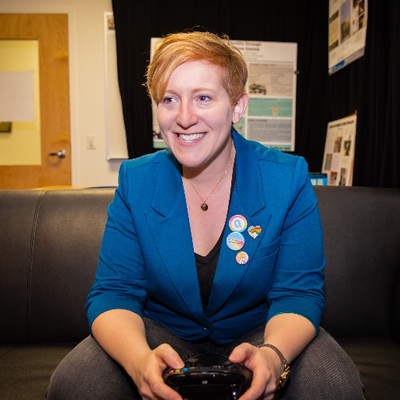For the past 10 weeks, I’ve been hard at work writing the full manuscript of my book Playing Queer: Sexuality, Gender, and Identity in Video Games beyond Representation. It’s now in the hands of my editors (woot!). Until the plan for publication is a little more official, I’m going to be superstitious and hold off on details — but it looks like it will land with a series and a press that I’m really excited about.
I feel like Playing Queer has been a long time coming, not just because queer game studies is a fast-emerging field, but because I’ve been learning, and thinking, and thinking, and learning about LGBTQ issues in video games for years, and once I began writing in earnest it all started pouring out. I’m so grateful to all the collaborators, co-organizers, and game-makers who have worked with me and helped me become the queer game studies scholar I am today.
Here’s a little taste from the introduction, to give you a sense of the claims I’m making. More updates coming soon, as Playing Queer chugs along through the academic publishing process…
Video games have always been queer. Even games that appear to have no LGBTQ content can be played queerly, and all games can be interpreted through queer lenses. This is because queerness in video games means more than the representation of LGBTQ characters or same-sex romance. Queerness and video games share a common ethos: the longing to imagine alternative ways of being and to make space within structures of power for resistance through play. From the origins of the medium, to the present day, and even reaching into the future, video game worlds have offered players the opportunity to explore queer experience, queer embodiment, queer affect, and queer desire—even when the non-heteronormative and counter-hegemonic implications of these games has been far from immediately obvious.
Through new critical perspectives, queerness can be discovered in video games, but it can also be brought to games through players, whose choices to engage with games on their own terms and for their own pleasures can profoundly transform the meaning of games and unleash their queer potential. In this way, queer play, like queer interpretation and queer game design, can be seen as a transformative practice that reframes and remakes games from the inside out. Amidst a games culture that has proven itself to be openly hostile to diversity, the politics of queer play echo outward across games communities, games history, the games industry, and into wide-reaching contemporary concerns around identity, marginalization, agency, and digital media.

